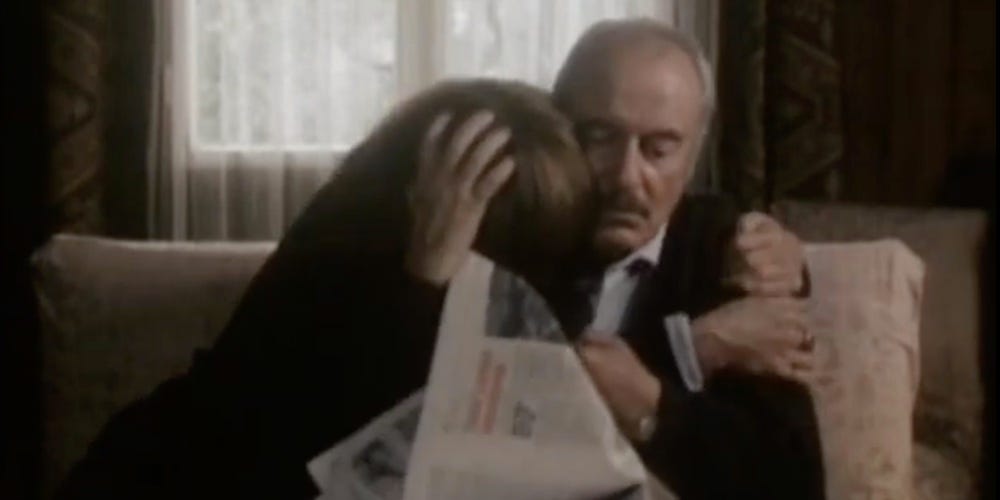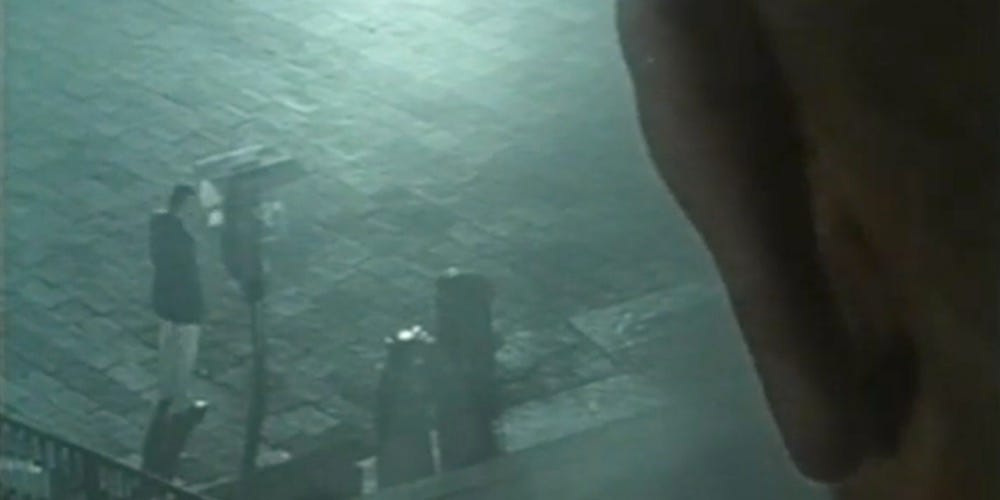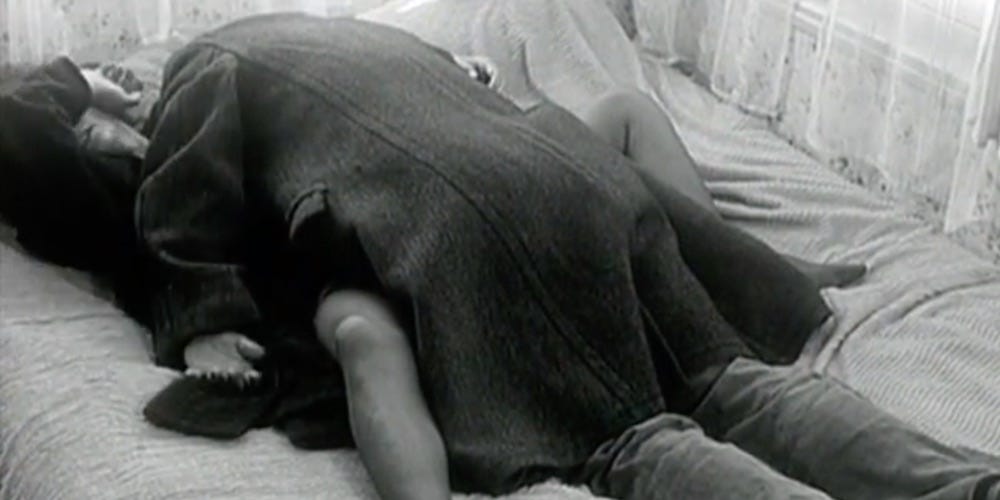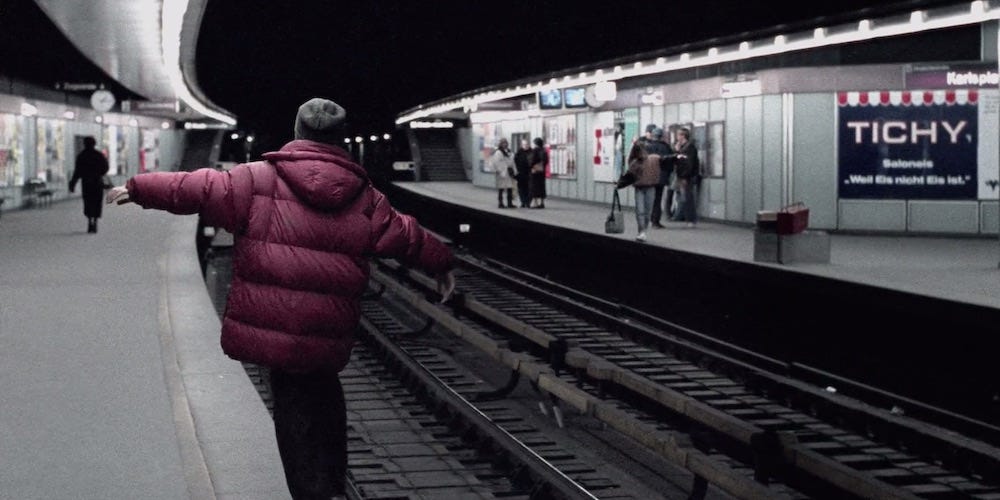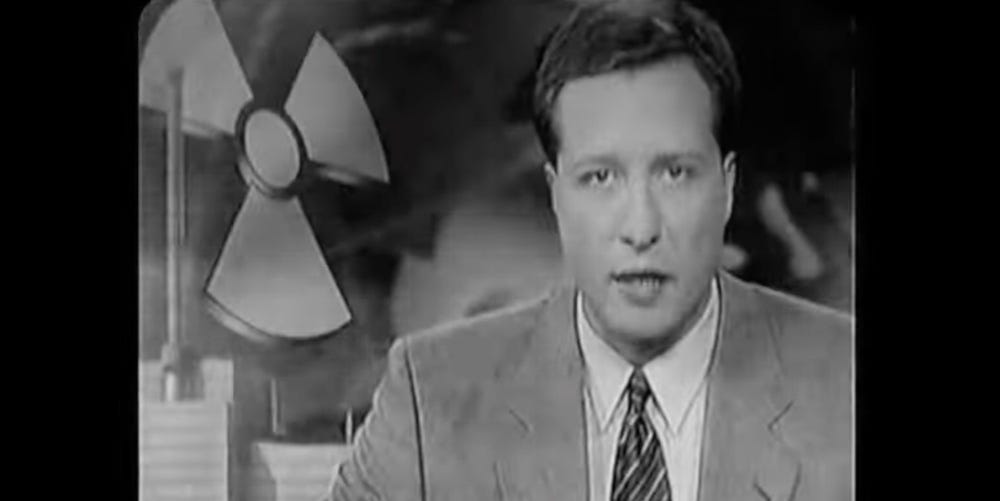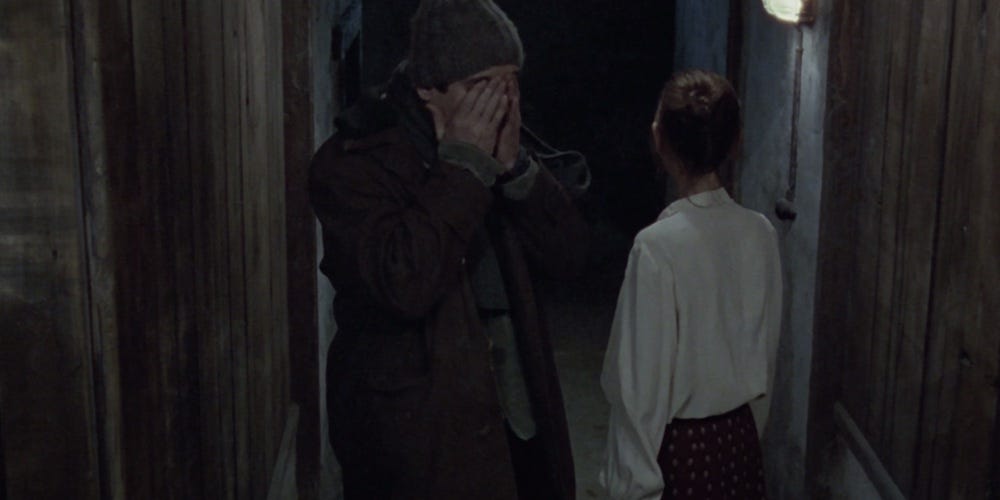part 1: know your enemy (1976-1986)
haneke was cranking out TV movies from the mid-’70s up until he made seventh continent in ’89 (he even made a couple more in the ’90s after establishing a film career), which, in spite of being very difficult to find online and essentially being glossed over as canonical to his career (likely due to the ‘difficult to find’ thing), and in spite of clearly being screenplays filmed for the mundane medium of TV, are actually really great—even beyond just showing glimpses of haneke’s familiar later themes (more specifically the film-within-a-film of 2000’s code unknown reuses an odd bit of dialog from the TV film three paths to the lake (lifted from its literary source material) which was soon after reused in the same setting (a lake) and context (among family) in fraulein).
i only watched the five pre-film-career movies i could find on youtube, though it sounds like after liverpool (1975) and the two-part lemmings (1979) were among the most well-received. also, from what i read, it sounds like there may have been others, but none of them are listed on wiki, letterboxd, mubi, or any other sources i referenced.
i’ve also included his 1997 TV adaptation of kafka’s the castle (i believe his only TV movie you can currently find on streaming services aside from youtube uploads) at the end of this post, while additional TV stuff from the decade (obituary for a murderer (1991), the rebellion (1993), and the moor’s head (1995; for which he only wrote the screenplay)) are, to my knowledge, not available to stream anywhere. i’ve also noticed his 2013 filmed theater adaptation of mozart’s cosi fan tutte is often categorized as a TV movie, and it is on youtube, but it is incredibly long and looks dull as hell and very much not for me so i went ahead and skipped that one.
three paths to the lake (1976) melodrama taking chic arthouse romantic indecision and highlighting the subject’s futility against the backdrop of post-WWII europe (unless this is just my anti-rohmer bias speaking). plenty of early glimpses at haneke attempting to engage and/or irritate the viewer between the film’s operatic score abruptly cutting out every time the phone rings, to its subjects’ ages being presented by a narrator as an overly complex math problem, to its jarring cuts to isolated and yet-unexplained images beginning with the most graphic shot of the whole movie (naked guy in a bathroom yelling) spliced in at the four minute mark. knowing haneke’s later filmography it’s hard not to focus on a subplot about the ethics of professionally documenting violence (a conversation specifically resurrected briefly in code unknown), while i suppose the primary plot of spending an extended period of time at your childhood home drowning in visceral memories and traumas presents its own form of sadism.
variation or ‘utopias exist – yes, i know…’ (1983) movie about two people in the midst of an affair complaining to their devastated significant others about how hard it is for them to be having an affair. echoes the soap operatics of fassbinder while looking to bergman for its deeply prodding conversations about relationships and even finding a smidge of humor in the complicated ways we tangle each other up in our lives (‘the funniest private comedy ever,’ as one character puts it). that said, familiarly hanekeian in its fractured storyline—it takes a while to decipher whether we’re getting our sparse context chronologically, while there’s really no indication as to how much time passes between scenes. also hard to ignore an early exchange explicitly spelling out haneke’s future agenda of making his audience aware of their own expectations for the visual media we’re consuming: for one thing, we need the satisfaction of knowing how the story will end.
who was edgar allan? (1984) quiet entrant in the the city of venice’s anti-tourist feature film canon ambiguously peddling in cons, murder, and coke (both drug and beverage). consistently slow and moody in lieu of haneke’s familiar fragmentation and purposefully incredibly long takes (and backed by a weirdly conventional TV-drama OST), the most uncharacteristic aspect of this movie is the fact that you gradually become aware of the fact that it’s all just a giant prank being played on its subject rather than its audience. at least i think….i stopped being entirely sure what was going on two-thirds of the way through after a mid-film fourth-wall-deconstructing monologue.
fraulein: a german melodrama (1986) movie that eerily invokes the feeling of posting our little bits on social media through the daily news cycle of genocide and other political violence, or of watching our silly movies as if the world isn’t actively immolating. the concept of POWs returning home to find a vibrant youth culture and a budding sexual revolution thriving in their absence feels like such an apt metaphor for this continually developing sensation of two vastly different realities populating our timeline that it’s hard to comprehend that they’re existing simultaneously. B&W cinematography and mid-century setting obv recalls white ribbon, but the uphill battle of gathering information, frustrating jump cuts, and frequent confusion as to what is and what is not film-within-film all invoke code unknown. turns out it would’ve helped to have seen maria braun less than, like, eight years ago going into this. i’m sure a better understanding of munchausen would’ve benefitted me too.
part 2: a frigid bitch (1989-1994)
haneke’s first three feature films make up his self-proclaimed (and immediately de-proclaimed) ‘glaciation trilogy,’ leading up to its final boss of sorts funny games in 1997. here he pivots from the austrian literary adaptations to original screenplays finding inspiration in the type of horrific news stories that inspired the onion’s evergreen ‘no way to prevent this’ post (in fact news stories and ethical yet mundane word-of-mouth urban scenarios largely inform his filmography at least through 2005’s cache). as a meticulous storyteller here he emphasizes a sense of ambiguity that seems intended to give everything a dual and contradictory meaning, if not open the story up completely to a sort of morbid choose-your-own adventure culminating in at least one murder and/or suicide (again, murder/suicide is central to just about every one of his movies until 2017’s happy end).
in addition to these movies’ focus on morality and peripheral obsession with chance—if not something more divine—the mostly-unrelated trilogy with an impossible to diagnose energy reminds me a lot of kieslowski’s three colors films, while funny games is like their double life of veronique in the sense that it’s like the trilogy only much more so.
for additional reference i’d also recommend ross mcelwee’s 1996 doc six o’clock news, which, like 71 fragments, essentially makes a point of chasing down context for feel-good or -bad breaking news stories. also happened to watch atom egoyan’s family viewing right after wrapping up this project and it eerily anticipates several of benny’s video’s themes regarding TV and other communication technology disrupting domestic spaces (not to get ahead of myself here but it also seems to invent the rewind scene from funny games).
the seventh continent (1989) movie that may or may not imply that australia is hell? very clear distinction between this first theatrical movie and haneke’s TV stuff from the first 10 mins when we see nothing but brand names and disembodied limbs in what feels like one of the most capitalism-wary urban stretches of a -qatsi film, while national political allegory later proves vacant as more generically set scenes balancing comfortable middle-class routine and the tragedy that surrounds it (bumping muzak while cruising past a horrific car wreck, e.g.) fill that void. ultimately proves to be the consumerist existential malaise cousin to the conversation’s paranoia as the prolonged dual suicide of self and belongings opens up countless interpretations: is it an act of if-i-can’t-have-it-no-one-can selfishness that the family destroys all their belongings alongside themselves, or is it an earnest belief that if they ruin everything they own it’ll be brought with them to the great big down-under in the sky? while haneke’s always refused to treat his audiences like children it’s as if he’s telling this story from the perspective of one as she picks up on fragments of her parents’ inner lives which, unlike TV personalities, can’t be tuned into around the clock.
benny’s video (1992) direct middle ground between the middle-class-family death-scheming/transcontinental escapism of seventh continent (the movie also nearly opens with the exact same image that that one closes with) and the audience confrontation of funny games in its stomach-churning early climax as we secretly hope for a peek at the violence we’re hearing and/or an immediate end to the off-screen suffering. love the subtle shift from an oddly conservative implication of the toxic avenger and ac/dc as the culprits for coaxing latent homicidal tendencies in teens to placing the blame on the types of uptight parents who might believe this form of extreme entertainment to be detrimental to their kid’s psychology, who ultimately prove capable of acting significantly more brutally when their son’s professional future is on the line. kind of feels like the metaphor here is that corporate crime is just like juvenile delinquency only more methodical. i also like the scene where benny casually unnests a russian doll midway through the movie, checkov’s-gunning an elaborate metaphor for watching people watch people watch violence into a likely bonus second climax.
71 fragments of a chronicle of chance (1994) an entire magnolia’s worth of deeply joyless slice-of-life/verge-of-breakdown storylines interlaced not by aimee mann and divine amphibian intervention but by the 24-hour news cycle that covers these phenomena and the christ figures who die to keep it running. compared to its predecessors in the trilogy this feels to me much guiltier of haneke detractors’ proposed flaws—preachiness, nihilism, his movies just being 71 weird fragments rather than a digestible whole—and it even tests his own dictum of ‘give the audience nothing’ by dropping plenty of clues both explicit (dual stresses of academia and (tabletop) sports) and implicit (even within nations not constantly ravaged by war there’s plenty of adults criminally unfit to oversee children, pop-superstars included) as to a nearly anonymous citizen’s violent motives. hits hardest when viewed immediately after seventh continent and benny’s video—final scene really nails the sense of media-fatigue constant exposure to bite-sized tragedy elicits, especially when those stories start re-cycling through at the top of the next half hour.
tl;dr: an interlude (and a return to TV) (1995-1997)
haneke condensed to 60 seconds; plus, a bonus literary adaptation for TV.
lumiere and company (1995) anthology movie where 40 established and up-and-coming filmmakers from across the world celebrate the centennial of the titular bros’ original film camera by using it to shoot a 60-second film. though i know this isn’t the point, i realized a lot of these directors used the opportunity as a sort of old-timey sizzle reel to establish their filmmaking philosophies in a condensed timeframe (lynch’s contribution, for example, certainly, um, livens things up). case in point, in his film haneke cuts together a minute’s worth of newsreel footage from the day of the 100th anniversary of the lumiere’s allegedly hysteria-causing train film with the ulterior motive of continuing his pre-funny games M.O. of criticizing the news’ thoughtless juxtaposition of images of dead bodies with sports reports. i guess the subtext here is a nod of appreciation to the creators of the visual medium he works within for creating an avenue of intellectual criticism while artistically evaluating the irresponsible medium it later spawned.
the castle (1997) almost certain i’ve never read this novel but i’ve definitely read enough kafka stories about a guy who’s seen as a nuisance for simply existing within spaces that bureaucratic neglect has led him to exist within as he keeps saying ‘there’s been a misunderstanding’ amid frequent references to a person and location that remain eerily absent told across a weirdly half-accelerated timeline to get the gist of this one. really feels phoned in when compared to haneke’s earlier TV movies, as if he’s scratched all his artistic itches with his feature films and is fully committing to his obnoxious insistence that there can be nothing artistic shown on television by drowning out the story in voiceover rather than employing his growing cache of cinematic ideas beyond his fragmentational editing technique and hiring actors familiar from his recent films (his juliette/isabelle prototype, who does not phone it in here; german richard jenkins). i guess you could say he does dip into metacommentary at the end when the protagonist starts falling asleep sitting up while a guy says boring shit to him.
part 2.5: ‘don’t forget the entertainment value’
funny games feel like another career-up-to-this-point td;lr for haneke as it succinctly summarizes some of his prior films’ more opaque themes while claiming to shift its focus from TV to sadistic horror films. which begs the question of whether haneke intentionally made it so critical of TV.
i also found it interesting that haneke—ever wary of everything going on in hollywood—never seemed to have addressed scream in his interviews from that era, a movie which came out a year prior and which very closely resembled what he’s doing here (the extended opening scene to that movie even features its killer sadistically presenting his behavior as a ‘game’) up until the line ‘movies don’t make psychos, movies make psychos more creative.’ kinda get the sense funny games was written as a response to the hype surrounding that specific movie without haneke realizing it was openly dissecting itself.
funny games (1997) movie examining the eggs that necessarily get broken to make a successful home-invasion thriller. in spite of half of the movie’s cast dramatically acting like they’re in this type of movie while the other half zizeks themselves into it in order to outline genre conventions (i.e. the titular funny games) while book-of-job-ing their victims, it’s interesting that it consciously sticks to TV’s strict content guidelines (nudity and violence—minus one incident that’s promptly reconciled—occurs offscreen; the only swearing immediately receives reprimanding) before jarringly shifting to a deeply bad-TV shot spanning 10 mins of unattractive grieving that allows us to reflect on the fact that we’re bored now that the most horrific scene of violence is over.
in fact haneke’s anti-TV agenda can be seen in the prior scene where atrocities take place in the family home while the buzzing television set shows something relatively mundane, countering the news footage sprinkled into his prior films which get referenced early in the movie when beavis gives a simpering media-outlet-speculation-y explanation (divorce, addiction, incest) for why he and butthead are doing violence as the family watches, squeezed together on the couch directly facing them as if tuning in to their broadcasted story. with the pervert’s guides in mind it almost feels more like haneke’s take on an essay film than a postmodernist wink-wink fest. y’know, minus the scene where the guy literally winks at us.


